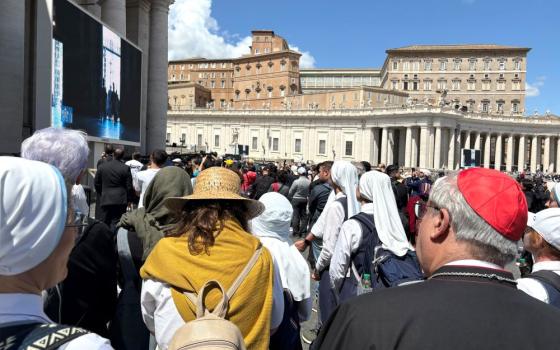NEW ORLEANS -- For the past 60 years, teachers and administrators at St. Augustine High School in New Orleans have wielded an 18-inch-long wooden paddle -- euphemistically called "the board of education" -- to administer corporal punishment to students for tardiness, sloppy uniform dress or other minor rules infractions.
When Archbishop Gregory M. Aymond and Josephite Father Edward Chiffriller, his order's superior general and head of the school's board of trustees, ordered the practice stopped following an intensive review process, their decision was met with outspoken opposition from parents, alumni, students, the school's board of directors, and both current and former administrators.
That disagreement played out during a three-hour, 50-minute "disciplinary town-hall meeting" Feb. 24 at the St. Augustine gym. About 600 people attended.
As Archbishop Aymond and members of the Josephites' board of trustees sat at a table and listened, speaker after speaker -- including Josephite Father John Raphael, St. Augustine's president -- passionately explained why they supported the use of corporal punishment and asked that the moratorium be lifted.
St. Augustine is the only Catholic school in the United States to have permitted corporal punishment as recently as 2010.
Father Raphael shared historical references to the school's founding principal, Josephite Father Matthew O'Rourke, who instituted paddling in 1951 as a deterrent to unacceptable behavior. He even introduced his parents, who were sitting in the audience, and praised them for spanking him as a child as a way of instruction.
Father Raphael made a point of telling the crowd that Father Chiffriller, his religious superior, had given a speech at the 50th anniversary of the school in 2001 on the historic value of the paddle as a deterrent.
When it was his turn to speak, Father Chiffriller said, "In light of the archbishop's concern and the Josephites' own internal concerns, the board of trustees reviewed the practice of corporal punishment and determined that its continued use is simply inconsistent with our Catholic ideals, ethics and principles."
Of the more than two dozen alumni, parents and students who spoke, none expressed opposition to the paddling policy.
While calling the issue "complicated," Archbishop Aymond did not retreat from what he called "a fundamental disagreement."
"I do not believe the teachings of the Catholic Church, as we interpret them today in 2011, can possibly condone corporal punishment," Archbishop Aymond said.
The archbishop said parents have the authority to use corporal punishment in their homes to discipline their children, but he reiterated he could not "possibly condone corporal punishment, especially in a Catholic school."
"I believe in my conscience that this is not in line with the values of Jesus," Archbishop Aymond said, adding that was why the Archdiocese of New Orleans has for decades not permitted corporal punishment in its schools.
Archbishop Aymond said numerous studies have indicated corporal punishment can cause physical, emotional and psychological damage, including loss of self-esteem and increased hostility toward authority, and that "violence -- hitting another person -- fosters violence."
Daniel Davillier, chairman of the board of directors, said the disciplinary review committee surveyed a range of parents, students and alumni, and found there was wide support for corporal punishment, although there were calls to modify certain aspects of the process, such as not paddling an entire group for the actions of a single student and restricting the number of teachers or administrators who had the authority to paddle students.
But when the modified policy was submitted to the board of trustees, it was rejected.
"As you might imagine, that didn't sit well with the board of directors," Davillier said. "We asked to meet with the archbishop and have a productive dialogue, and he maintained his position that it was inappropriate and morally wrong."
In the five months since the school stopped paddling, principal Don Boucree said discipline at the school has deteriorated because it has had to resort to more of a "zero tolerance" policy for unacceptable behavior.
"There are four types of infractions, and corporal punishment basically takes care of the first two, which are considered minor, such as being late for class or not having your uniform correct," Boucree said. "What has happened is that the infractions that would have stopped by now have continued to rise, causing the severity of the penalties to increase."
Boucree said bullying, tardiness, parental intervention, Saturday detentions, suspension and expulsions have increased from last year.
Archbishop Aymond said it was good for him to listen to the feelings of the parents and alumni.
"Nothing was resolved (at the meeting)," he said. "Whenever there is a split in the family, we need to pray, we need to dialogue and we need to ask, 'What does God want out of this?' I certainly will be meeting with the Josephites as well as the board of directors to see how we can come to a better understanding and resolution of the issues."



